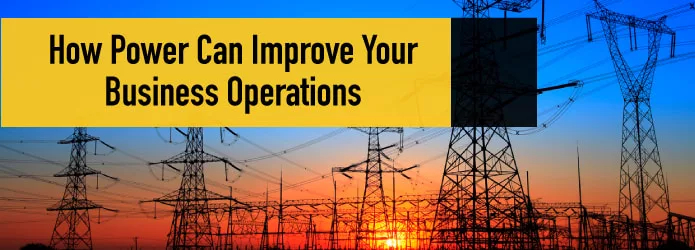
In virtually all branches of government as well as the business, industrial and medical sectors, nothing is more crucial than the uninterrupted supply of electrical power. Without power, businesses can’t function, factories can’t operate, stores and restaurants can’t serve the public and hospitals can’t provide vital care to patients.
For homeowners, it’s also crucial to have a non-stop supply of power as well as a backup contingency in the event of a blackout. A blackout might last as briefly as 30 minutes or as long as 30 hours, but within that time you could incur damage to your electronic equipment, endure discomfort from lack of temperature control and suffer major inconveniences due to a loss of light.
Thankfully, homeowners, businesses, and hospitals alike can all be assured an uninterrupted flow of power with the use of backup generators.
The Benefits of an Uninterruptible Power Supply (UPS)
When systems are put in place to provide uninterrupted power in the event of a blackout scenario, catastrophic losses can be avoided by businesses, factory operators, restaurateurs, hospitals, apartment landlords and even homeowners. A UPS system can help you avoid the common pitfalls of power loss, such as productivity downtime and the costly loss of data and resources.
Additionally, a power backup generator can allow you to see maintain comfortable temperatures within your living quarters during what could otherwise be a lengthy period of darkness, boredom and discomfort.
1. Reduced Downtime
When public buildings are equipped with UPS systems, there’s far less likelihood of closure in the face of local power outages. While the occurrence of a thunderstorm or downed power line might be a setback in less-equipped quarters, those who prepare themselves with backup generators will have the ability to carry on as normal.
The reduction of downtime is especially important for any public service institution that people rely on for their medical and healthcare needs. As far as entertainment events are concerned, UPS systems allow the show to go on even when the lights go out in other parts of town.
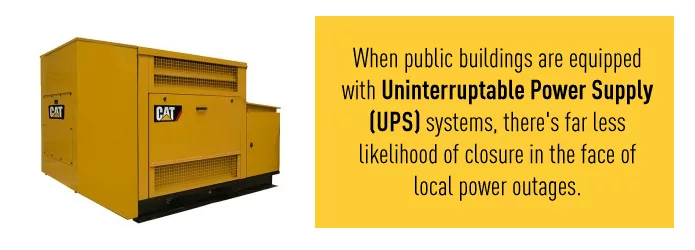
The ability to stay powered can help reduce the following occurrences:
• Interrupted communications:
Downed power in one area can have a domino effect with other parts of the country. As the news breaks of a power outage, people from other states and regions are bound to send emails and phone calls into the affected area to see how friends and loved ones are faring in the face of the storm or natural disaster that has taken place.
Confirmation of this sort can be hard to achieve, however, when the affected people cannot get online or recharge their smartphones. With UPS systems at community centers, residents in affected areas can answer the calls of concerned friends and relatives.
• Canceled events:
When local storms and power outages occur, local residents are weary of cabin fever. In the face of an imminent storm, there are few things worse than being told you’ll have to stock up and lock up for the next three days or more — especially when you’ve been looking forward to a major concert or sporting event.
When stadiums and concert halls have UPS systems in place, there’s less likelihood of forced cancellations when local power outages occur. Half the city might be out of power due to a windy snowstorm that just took place pthe night beforehand, yet people are eager to get on with their plans. With backup power generators, local venues can proceed as planned and provide entertainment when the public needs it most.
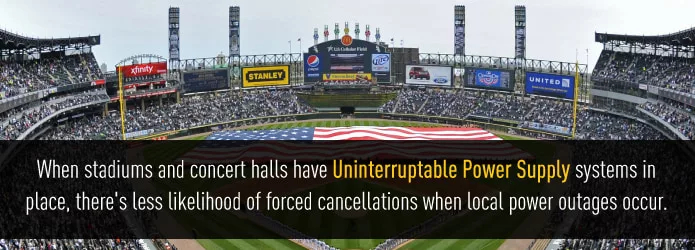
• School closures:
For children and teenagers, one of the most exciting things about snowstorms and blackouts are school closures. In all likelihood, people in this age group get the most enjoyment when public facilities come to a halt, especially now that they can access the internet with smartphones and Wi-Fi. Trouble is, if they miss too many school days during winter, they’ll have to make up for it during summer.
When schools have UPS systems in place, classes can go on as normal as long as local area transportation options are safe and unencumbered. This way, a school can resume once paths on the road are cleared of snow and ice.
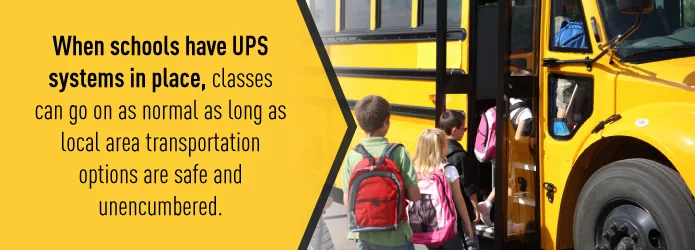
2. Ability to Keep Operations Running
The scariest parts of power outages are the effects they can have on the vital operations that make the world go ‘round. If a hospital goes powerless, for instance, patients could suffer and possibly die. At grocery stores in affected areas, vast quantities of frozen foods and produce could perish, leaving communities with little left to buy as at-home stockpiles also go to waste.
With UPS systems in place, money, resources, and even lives are saved thanks to the uninterrupted flow of the following operations:
• Industrial productions:
Power interruptions can be a costly occurrence at factories, where time is money when it comes to mass manufacturing. On products that require a series of assembly steps in quick succession, a sudden and prolonged halt in pneumatic machines and conveyor belts could put the whole production to waste.
The capital invested in a mass production is far more ensured at factories where power sources are backed up with UPS systems. In the event of a mainline power interruption, production can continue without missing a beat.

• Hospital functions:
If there’s one institution that can never be without power, it’s the hospital. Simply put, lives depend on the continuous operation of medical devices that run on electrical power. At hospitals, any given number of patients will be connected to life support systems that help to maintain heart rates and respiratory functions, among other purposes.
When natural disasters occur, emergency rooms are bound to be flooded with injured patients, some gravely so. In times such as these, a hospital cannot succumb to the power outages that are liable to affect the surrounding community. Therefore, UPS systems are an essential component of all hospitals and medical facilities.
• Food preservation:
Produce, frozen goods and other perishables can quickly go to waste when refrigeration units fail. In homes affected by power outages, this can largely defeat the purpose of stocking up in preparation for a storm. The problem can be catastrophic for grocers who serve communities — especially those in small towns where no other options exist for many miles.
A grocery store cannot afford to lose two-thirds of its goods during the course of a several-day power outage. A disaster of this magnitude would financially devastate the grocer, place undue demand on suppliers and leave hundreds of local shoppers deprived of food options. Protection against power outages is essential for all grocery stores.

• Public transportation:
Thousands of people rely on mass transit systems on a daily basis. When storms and natural disasters strike, people are liable to either lock themselves indoors or flee en masse from the area, depending on the circumstances. Either way, public transportation systems should always be in operation, whether people need rides across town or to the nearest train station or airport.
The trouble is, even if the vehicles are fully capable of operating, a public transportation system can’t function if there’s no ability for the system center to coordinate schedules and communicate with vehicles. As such, UPS systems must be in place at all mass transit centers for power backup in the event of an emergency.
3. Help With Common Power Loss Situations
One of the worst things that can happen to a commercial or residential property is a loss of power. At hospitals, restaurants, grocery stores, airports, train stations and factories, electrical power is essential to the continuity of services and the safety of operations. When power goes down, the problems can range from food spoilage at grocery stores to interrupted patient care at hospitals.
To mitigate the disaster scenarios that often accompany power loss, UPS systems are often installed at hospitals, businesses, public transportation centers and industrial facilities. With an uninterruptable power supply, there’s little risk of vital services being stalled or perishable items getting spoiled.
In virtually any public entity, the presence of a UPS system can prevent disaster when the following problems strike:
• Lightning:
One of the most dangerous things for any grid of power is the occurrence of lightning, which strikes in heavy thunderstorms and is often drawn to transmission towers and other high-reaching metal structures. When lightning strikes at these spots, the affected lines that give power to nearby properties are instantly struck down, leaving homes and buildings powerless.
With UPS systems in place, nearby businesses and service centers can prevent the interruption of power when lightning strikes. A backup power generator can be set to turn on the second a main power supply is interrupted, leaving hospitals and grocery stores unaffected by the loss of neighborhood power. UPS systems can even be set up in apartment complexes to spare tenants the burden of power interruptions.
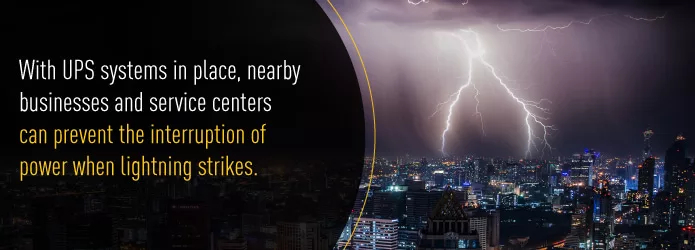
• Ice and snow:
When snow hits, electrical lines are in jeopardy. In the parts of the country that see intense bouts of snow during wintertime, downed power is a well-known fact of life — especially among older folks who remember all the local blizzards that occurred in the days before UPS systems became commonplace. Even today, with most of the U.S. better-equipped for ice and snow, power outages are still a threat in many areas.
In order for businesses, grocery stores, hospitals and public service centers to avoid the risk of power outages in the face of snowstorms, UPS systems are a must. When snow hits and ice forms, the snow banks and layers can keep buildings, streets and sidewalks covered for days. The facilities that provide food and patient care cannot afford to wait that long. With so many people in need of emergency supplies and medical treatment in the face of snow, grocery stores and hospitals can only remain up and running with the help of power backup systems.
• Fallen trees:
When lightning and blizzards strike an area, the chances of temporary power loss are high in local residential areas. While the problem is often the result of downed power lines, one of the biggest threats to homes is the falling of trees, which can wield a mighty impact on fences, cars, rooftops and sometimes directly through the center of a household living area.
For obvious reasons, fallen trees pose a huge threat to the continuity and well-being of household functions, including a home’s power supply. To prevent the loss of power in the event of a fallen tree, backup power generators are becoming an increasingly popular safety contingency. With a UPS system setup in your home, there’s far less chance a local blackout will leave you with melted foods in the fridge and a toasted set of computer and stereo components.
• Flooding:
When it comes to the sanitation of a local area, nothing could possibly be worse than floods, which disperse river water and sewage along the sidewalks, lawns and even across the ground-level floors of houses and buildings. Floods can also pose a grave danger to the power supplies of affected areas, because the flood water will sometimes rise high enough to engulf AC outlets. In properties with basements that store power lines and electrical components, the effects of a flood can be especially disastrous.
Even though floods are generally a call for locals to evacuate an affected area, the time it takes to grab your belongings and make for a safe haven can be made easier with a UPS system in place. With a power backup generator, you and your family are likely to be far safer against the blunt effects that give rise to floods, which can be caused by something as drastic as a dam burst or as simple as a prolonged, heavy rainstorm.
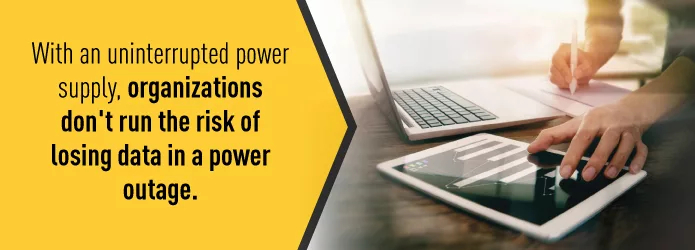
• Downed poles:
Not all power outages are caused by volatile weather and natural disasters. Sometimes, a neighborhood power supply can be knocked out by something as simple as the collision of a vehicle into an electrical pole. When a car hits a pole, the lines that connect a chain of houses will often be unable to provide power for hours, if not days, as city crews work to restore the lines.
To spare yourself the inconvenience of downed power when a nearby pole is struck, it’s best to arm your house or building with a UPS system. A backup power supply source can help you stay connected during hours when the power is down. Even if the downed pole is due to a more drastic cause — such as a blizzard or lightning storm — a UPS system should keep your fridge food cold and your internet connection active.
• Natural disasters:
Perhaps the biggest test of all for an electrical system is a natural disaster, which can swoop entire homes into the air if the wind centers are powerful enough. Whether your area is hit by an earthquake, tornado or hurricane, the damage will no doubt be costly, but people won’t necessarily be deprived of electricity as long as UPS systems are in place.
4. Protection of Data
With an uninterrupted power supply, organizations don’t run the risk of losing data in a power outage. This is especially important at data centers and IT firms, where vital information is recorded on computer systems by the second. In the event of a major blackout that causes power grid failure across dozens of miles, a UPS system can ensure that data centers remain in full operation and continue to serve data as the situation unfolds.
Data protection is an issue of concern for any organization that has a network of computers on its premises. Even though most of today’s businesses have accounts with cloud servers, volumes of yet-to-be uploaded data could still be lost if a brownout occurs and fries the hard drives on a company’s computer system. To ensure that tech-destroying brownouts and blackouts don’t strike a network of computers, power backup machinery is an essential component of a company’s technological infrastructure.
The protection of data is also important at hospitals, where patient information is recorded every minute. If a hospital’s system was to go down for even ten minutes, vital information about the health status of a patient could be lost forever. UPS systems ensure hospitals never lose vital patient data or encounter any interruptions in the performance of heart monitors and scanners.
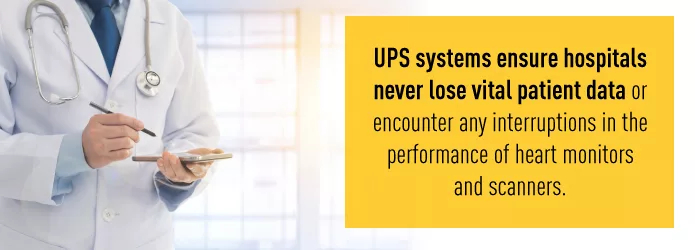
5. Cost-Effectiveness
The initial investment in a UPS system can pay itself back during the course of a single blackout when you consider all that would otherwise be lost in such an event. For large companies, the potential loss of data and vast damage to computer systems can all be avoided when a power backup system is put in place to prevent even momentary losses of power when electrical mainlines go down.
For smaller businesses with less insurance coverage to handle the costs of blackout recovery, the implementation of a UPS system could make all the difference between continuation and abrupt closure in the event of some catastrophic local-area power outage. The benefits of having a backup power generator can even make a machine of this type an essential purchase for today’s homeowner.
Whether you own a small or large home, a backup power generator can spare you and everyone else in your household the inconvenience and possible loss that might otherwise accompany a power blackout in your area. If your home is equipped with lots of high-priced stereo and computer equipment, a UPS system could spare all such equipment from the potentially damaging effects of improper shutoffs, as well as the power surges that often occur when electrical lines reactivate.
6. Use in Emergencies
Today, residential homes can be equipped with portable power generators that allow families to experience all the benefits of uninterrupted power when mainlines go down. This way, families don’t have to dispense with perishable foods and beverages due to lack of refrigeration, which is especially important if you’ve stocked up in advance of a storm.
The backup power supply will also make cabin fever more bearable because you won’t need candles to see at night and you won’t need blankets and sweaters just to stay warm. Your house will still have heat and light when the power is down.
If you work from home on your PC or laptop, a backup power supply could be essential to your livelihood. For instance, if you’re making last-minute edits on a document and the power goes out immediately before you hit “upload,” a UPS system will save you the trouble of lost work and disgruntled business contacts.

Compare the Different Types of Power Products and Services Available
For more than 90 years, Cat® has provided industrial machines, trucks, and parts to assembly plants, construction crews and businesses around the world. Today, we’re making backup power more affordable and accessible than ever with the Cat RP Series line of portable power generators.
Equipped with LED panel lighting and lithium-ion batteries that last for two years, the easy-to-use Cat RP Series includes several different sizes to suit a range of household power needs.
To learn more about the functions and benefits of the Cat RP Series of portable power generators, click here to contact one of our customer service representatives today.

